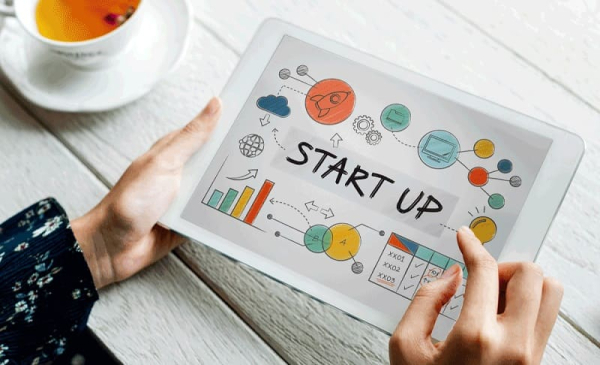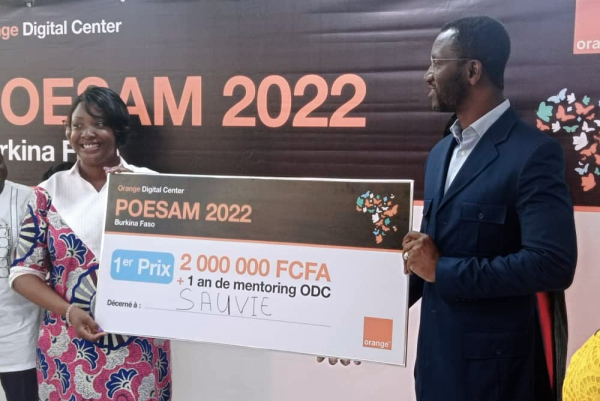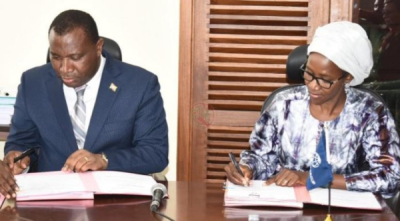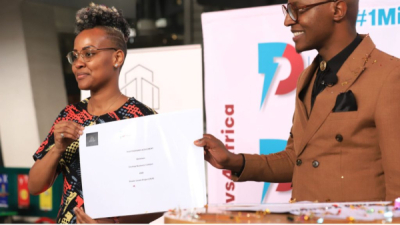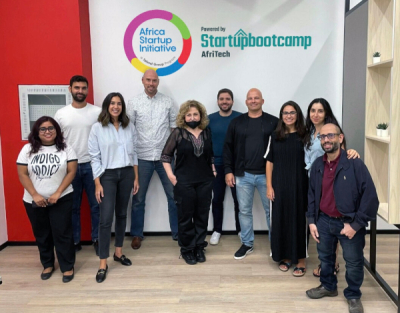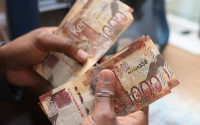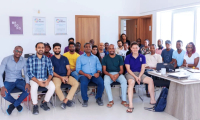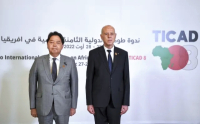
Tech (823)
The digital and mobile ecosystems are important tools that can help Africa achieve sustainable development goals. Indeed, apart from the jobs they can create, they can also improve education, health, and governance. That is why, in recent years, numerous projects are implemented to capitalize on the opportunities offered by those ecosystems.
The GSM Association (GSMA) and German Cooperation Agency (GIZ) recently issued a call for applications for the Platforms for Tomorrow acceleration program under the Mobile Innovation Hub jointly implemented in Tunisia since 2020.
The aim of the acceleration program is to support innovators that develop platforms to act as a bridge between supply and demand while facilitating social, economic, and human development. Applications are open till September 25, 2022.
The main targets of the 6-month acceleration program (October 2022- March 2023) are applicants whose solutions have active users, early sales, or already launched products. The solutions must also have strong social and economic impacts.
The program is also interested in solution developers with a potentially scalable product or service that has a significant total addressable market. It also targets innovators willing to improve the quality, performance, and well-being of their employees by offering dedicated training and solutions that have “potential for synergy with Mobile Network Operators (telecoms).”
Muriel Edjo
Orange issued calls for applications for the national phase of its social venture prize in Burkina Faso, on March 28, 2022. It received over 500 applications but only ten were selected to present their projects to the jury.
Last Friday, September 2, Burkinabe startup AINO Digital SAS’ digital identity project Sauvie won the first prize in the national phase of the Orange Social Venture Prize (POESAM) in Ouagadougou. The startup, founded by Scarlett Zongo (photo, left), thus won a check of XOF2 million. The second (Diabète contrôle) and third (Alliance Pharma) winners went home with respective checks of XOF1.5 million and XOF1 million.
The digital identity project, which won the first prize, is a bracelet with an ornament that is embedded with a QR Code. The QR code contains the wearer’s health information and emergency contacts. It, therefore, gives all the information needed to receive first aid when the need arises.
“We started working on the project in 2018 and finally launched it in February 2022. Since its launch, we have received important support from the national fire agency and the Ministries of Defence and Territorial Administration. We were able to work with those institutions to fine-tune Sauvie so that it can be able to address the issues faced by our societies,” indicated Scarlett Zongo.
Orange launched its POESAM awards, twelve years ago, to support startups that offer useful solutions to the population. This year, Burkina Faso has organized its fifth national phase, receiving more than 500 applications. During the national phase, a women entrepreneurs prize was also awarded. It was received by the founder of Women Health, who won a check of XOF1.5 million and one year of mentoring at the Orange Digital Center.
Let's note that the three winners of the national POESAM edition will take part in the international phase against the winners of sixteen other countries.
Adoni Conrad Quenum
Information and communications technologies have become vital tools in every sector nowadays. From democratized internet to digitized networks, they all have their importance and are strong allies in the transformation of economies. Burundi wants to capitalize on those technologies to efficiently implement its 2018-2027 national development plan.
Burundi will soon kick off the digitization of its public services. For that purpose, last Thursday, August 29, it signed a US$50 million financing agreement with the World Bank. The agreement was signed by the Minister of Finance, Domitien Ndihokubwayo (photo, left), and the World Bank's Resident Representative in Burundi, Hawa Cissé Wagué (photo, right).
According to Minister Domitien Ndihokubwayo, the agreement is an opportunity for the government to raise additional resources to dedicate to its e-government ambitions, allowing the achievement of planned development projects.
This funding will allow the country to install high-speed Internet connections, digitize its education sector, provide an internet connection to rural populations and improve public services. It will also enable the government to provide basic computer training to women and the less privileged.
According to the World Bank, Burundi has an excellent national ICT development policy but the institutions tasked with the implementation of that policy lack the capacity to do so. To date, only a few of the set targets have been achieved. The 5-year program funded by the World Bank financing aims to address the situation. The first project the government wants to implement for that purpose is the elaboration of a legal personal data protection framework.
According to the World Bank representative in Burundi, this project will support the government in the implementation of its digital vision defined in the 2018-2027 National Development Plan, which aims to transform Burundi’s economy.
Samira Njoya
Digital transformation is accelerating in Africa, forcing public administrations and private companies to adapt. However, there is a shortage of local skilled experts to support that transformation. Hence an urgent need to train a qualified workforce.
From September 1 to 30, 2022, applications are open for Power Learn Project’s one million software developers program in South Africa.
According to Mumbi Ndung'u, Power Learn Project’s chief growth and operations officer, through its “one million software developers” program, Power Learn Project’s goal is “to drive transformative change for the youth of Africa through technology skilling.”
“The program will offer online junior software development training [... as well as soft skills component in employability, entrepreneurship, and their mental well-being [...]to enable the learners to not only acquire entry-level smart technology jobs but to also be wholesome members of the community,” he added.
At the end of the 4-month learning program, participants will receive certificates proving they have completed the courses. This is the second cohort of the “one million software developers for Africa”. The first cohort was launched in Kenya, in June 2022. In the coming months, more cohorts will be launched in Zambia, Nigeria, Ghana, Rwanda, and Uganda.
In its "Africa Developer Ecosystem Report 2021" published on February 21, Google reveals that the demand for developers is growing worldwide, especially in Africa. Indeed, the ongoing digital transformation has boosted the need for developers and the continent may experience a shortage of professional developers if it fails to take adequate measures. That is why Power Learn Project wants to help train the next generation of developers who will support Africa in its digital transformation efforts.
Muriel Edjo
In 2016, Senegal launched DS2025, its strategy to develop its digital economy by 2025. The strategy is focused on several sectors to allow the modernization of the economy and improve competitiveness.
In Senegal, 105,000 jobs will be created in the digital sector by 2025. The figure was disclosed by Minister of Digital Economy Yankhoba Diattara, Tuesday, August 30, while opening the third edition of the National Digital Forum and the second edition of the Head of State’s Grand Prize for Digital Innovation.
According to the official, it will be the result of key reforms of the “Digital Senegal 2025” strategy, which will “undoubtedly allow the structural transformation” of the country’s economy, “position it as a digital hub in West Africa, and boost the digital sector’s contribution to GDP by 10% by 2025.”
Indeed, to successfully implement the strategy, the government will undertake a certain number of actions, which will create those jobs. For instance, the country intends to increase internet access for an expanded digital economy. Its plan in that regard is to increase 4G coverage to 90% and halve fixed and mobile internet costs.
Also, to facilitate digital adoption, the government recently adopted a startup law that will ease the development of innovative companies. It also plans to provide financial and technical support to guarantee the seamless development of innovative industries.
During his August 30 address, Yankhoba Diattara acknowledged that much remains to be done to reach the 2025 goal. However, he also expressed confidence in the country reaching those goals by the set deadline because the government is much committed to developing the “digital economy by injecting significant resources to strengthen the ecosystem.”
Samira Njoya
Fifty African startups have benefited from the program’s technical and financial support over the past five years. Its beneficiaries have already raised more than US$150 million in funding.
Incubator Startupbootcamp AfriTech issued, Monday (August 29) calls for applications for the third cohort of its ASIP Accelerator Program. Applications are open till November 11 for the program, which will run from February 20 to May 25, 2023.
To be considered, start-ups must be formally established and have at least two people working on the project and devoting at least 50 percent of their time to it. They must also generate revenues from the product and services they offer.
For this new edition of ASIP Accelerator Program, the targeted sectors are AgriTech and Supply Chain, FinTech, IoT and Connectivity; Machine Learning (Data Analytics), Cybersecurity, CleanTech and RegTech.
The ten early-stage startups selected at the end of the selection process will benefit from intensive coaching, pilot, and proof-of-concept opportunities that will open doors to longer-term business deals.
Each of them will receive €15,000 in cash as well as over €500,000 in credits and will benefit from exclusive partnership agreements with leading technology providers such as AWS, Google, Miro, Hubspot, and many others.
Five of them will be fully funded and supported by the EiA project and receive more support including access to the Euroquity community, networking events, monitoring, etc.
For this new edition, the incubator has the Netherlands Development Finance Company (FMO), the Senegalese General Delegation for Rapid Entrepreneurship of Women and Youth (DER/FJ), telecom operator Telecel Group, and Enrich in Africa (EiA) -funded by the European Commission's Horizon 2020 program- as its partners.
Muriel Edjo
In Africa, access to affordable loans is mainly the daily challenge faced by small businesses. In recent years, fundraising has emerged as one of the main sources for them to access the required capital and expand their businesses.
Scalable digital lending platform Pezesha announced on Tuesday, August 30, that it has secured US$11 million in pre-series A investment.
“We are excited about attracting institutional investors led by the Women’s World Banking Capital Partners II to harness our growth plans and push our mission to the next level. We are equally excited that WWBCP II intentionally invests in women, which allows us to cement inclusivity in our growth plans as a sustainable path towards our vision of building Africa’s MSME lending infrastructure,” said Pezesha founder, Hilda Moraa.
Pezesha was founded in 2017, in Kenya. It connects SMEs and financial institutions, helping the former raise working capital. Doing so “encourages meaningful financial inclusion and reduces inequality in access to formal financial services.” Pezesha also provides financial education and debt counseling to MSMEs to help them improve their credit score and have responsible borrowing habits as they move up the Pezesha financial ladder.
The additional capital, consisting of $6 million in equity and $5 million in loans, will enable it to expand its operations in its core East African markets and explore opportunities in new Sub-Saharan African markets.
The fintech claims to have more than 200,000 partners to date and over 100,000 loans made to MSMEs in Kenya, Uganda, and Ghana.
Samira Njoya
Zanzibar is known as one of the best tourist destinations in the world. The country wants to take advantage of this reputation to develop partnerships and become a technological innovation hub par excellence in Africa.
E-commerce platform Wasoko and the government of Zanzibar launched, Tuesday (August 30), the Wasoko Innovation Hub in Fumba. According to Wasoko, the hub aims to attract tech companies to the country and even woo them into relocating.
“As a Pan-African tech company, Wasoko has been looking for a location where we can bring together the best talents from across the continent and beyond to innovate and develop new products and services for our customers. While we considered more traditional centres such as Dubai and London, we were ultimately committed to the belief that technology for Africa should be built in Africa,” said Wasoko CEO Daniel Yu.
A few years ago, Zanzibar initiated efforts to accelerate its digital transformation. One of the initiatives taken was Silicon Zanzibar, which has Wasoko as a founding partner. Through the partnership with Wasoko, the government wants to create an attractive environment for technology companies, researchers, and industry professionals.
The Wasoko Innovation Hub will specialize in developing tools to personalize the customer experience, improve delivery metrics, expand financial service options, and collect key data and information across the value chain.
The new center will contribute to the development of Fumba, help create numerous employment and career opportunities, and establish the island as a leading center for pan-African technology companies. It will also enable the country to secure more than US$15 million in investment over the next decade.
The Wasoko Innovation Hub will focus on developing world-class technology solutions that will boost the African e-commerce sector. According to Zanzibar's Minister of Investment and Economic Development, Mudrick Soraga, the hub is to be an ideal and suitable setting "for all technology companies and their team members to be based in Zanzibar."
Samira Njoya
The somewhat tense relations between Algeria and France over the past few months is gradually being normalized. The two countries now want to capitalize on their historical bond as well as development issues to boost those relations.
During his friendly and working visit to Algeria, on August 25-26 2022, French President Emmanuel Macron (photo, center) announced several cooperation projects between the two countries. In the digital segment, in particular, he unveiled a project aimed at creating a Franco-Algerian incubator. According to the French President, the aim of the incubator is to let the two countries share their knowledge and innovations.
“Algeria has so many talents, and so do French and Franco-Algerians. That is the reason I want us to join forces to develop a bridging system [...], develop training and facilitate exchanges and joint innovations by our two countries, why not in the whole region,” he said.
Besides a training and project maturation framework for tech entrepreneurs, Emmanuel Macron also mentioned the creation of a €100 million fund to fund startups since financing is a key factor in their growth and success. Public Investment Bank BPIFrance will set up the fund, allowing tech entrepreneurs to promote projects, he added.
During the working visit, business mogul Xavier Niel, who was also part of the French delegation, announced the forthcoming launch of Ecole 42, a free coding school. The school was announced in 2017 but its launch has been delayed up to now.
Muriel Edjo
The African Digital Hub aims to take advantage of Tunisia’s geographical and geo-digital positioning to create a global digital hub.
During the TICAD 8, held in Tunisia last August 27-28, volunteer organization Tunisian Smart Cities (TSC) presented African Digital Hub, a pan-African project aimed at connecting Africa to the world.
According to the TICAD 8 whitebook published by the Tunisian-Japanese chamber of commerce and industry, the digital infrastructure offers an opportunity to establish a set of digital cardinals on the African continent, ensuring “the inter-connection of Africa with the rest of the world through a sovereign mesh of submarine cables.”
For Akil Sadkaoui, manager of the African Digital Hub project, the infrastructure will help boost connectivity in Africa, “therefore allowing residents to capitalize on new value chains in a context marked by growing e-commerce and mobile payment activities at a time when artificial intelligence, cryptocurrencies and soon quantum networks are constant discussion topics.”
The African Digital Hub will be implemented following a public-private partnership model. During its first phase (US$307 million), Green's Data Cities will be built, forming the building block of a large backbone network that will benefit allied cities.
The project is expected to create some 500 direct jobs. It aims to create a green digital sector that leverages green energy sources and an academic research program. For connectivity expert Damien Bertrand, thanks to the African Digital Hub, Tunisia could become the northern gateway of a sovereign and autonomous Africa while Bizerte will be the building block of that gateway.
Let’s note that the Bizerte governorate (in Tunisia) and the African Development Bank (AfDB) have already launched the feasibility study of the first phase of the African Digital Hub.
Samira Njoya
More...
Uganda has a high internet penetration rate. However, internet costs are still high, making the resource less affordable for many. The current plan to half the costs aims to make it more affordable.
The Ugandan government plans to reduce internet costs to promote the use of digital financial services and increase financial inclusion for vulnerable groups.
According to ICT Minister Chris Baryomunsi, the country will reduce the price of the data it provides through the national backbone by more than 50%, from US$70 per Mbps to US$30.
“We are talking about purely government internet. Once we cut down the cost at which government is selling to service providers, then they will automatically also reduce the cost that the end user will be paying and we think this will help in our efforts to digitize our economy,” he said last Wednesday.
By reducing internet costs, the country will support ICT innovation, and the development of digital financial services, communication, and e-government, among others. Several projects are underway to complement that measure. The most important of those projects is the National Data Backbone and e-Government Infrastructure project, with an estimated cost of US$75 million. It will connect the country’s major cities to a fiber optic network and connect ministries and administrations to the e-government platform.
The projects initiated are part of Uganda's Digital Acceleration Program, which aims to fill the current infrastructure gap and accelerate Internet penetration in the country.
Samira Njoya
In Africa, most schools teach lessons in official languages. Practically no courses are taught in local languages. Yet, researches show that teaching courses in local languages can greatly improve academic performance. This partnership may be an interesting experience.
Last Wednesday, Premium content streaming platform Ckrowd and Nigeria's Center synergies in areas of education, technology, and the dissemination and advocacy of knowledge for the Advancement of Education "School on Air (SOA)" signed a memorandum of understanding to offer digital STEM courses in local Nigerian languages, including Yoruba, Igbo, Hausa, but also in French.
For Kayode Adebayo (photo, right), CEO of Ckrowd, the MoU is a starting point to "generate synergies in education, technology, dissemination, and advocacy.”
The initiative comes after research results showed that many Yoruba youth increased their knowledge retention in science, technology, engineering, and mathematics subjects by 65% when studying in their native language. The same is true for Hausa students whose knowledge retention increased by 250% after learning STEM in their native language.
The goal of this agreement is therefore to close the education gap on the African continent and provide opportunities that will help students gain the technical skills, professional knowledge, and attitude needed to excel and function globally with a comprehensive curriculum that will benefit the next generation.
According to stakeholders, the initiative will reach more than 40 million young Africans, particularly in West Africa. It will enable students from different backgrounds to access education, and learning opportunities to improve their livelihoods. Doing so will contribute to sustainable development goal number four which aims to “ensure inclusive and equitable quality education and promote lifelong learning opportunities for all.”
Kayode Adebayo explains that the MoU is just the beginning of numerous projects to improve the living conditions of “the next generations of young Africans.”
To fulfill that goal, Ckrowd intends to partner with various parties “to deliver true value to young Diasporans and Africans on the Continent” as well as create “unique and ad-hoc local solutions and innovation to advance African nations and harness the new dynamic of the digital age, content creation, technology, and education.”
Samira Njoya
In Africa, biometrics adoption is rising steadily. A growing number of countries are getting interested in biometric technologies because of their effectiveness to combat fraud.
The Togolese National Social Security Fund (CNSS) recently launched Biosecu, a facial recognition web application to attest that its beneficiaries (pensioners and annuitants) are well alive at specified dates.
With Biosecu, the CNSS wants to allow its beneficiaries to perform those mandatory checks remotely. That way, they will no longer be obliged to reach out to dedicated CNSS agencies.
"Facial recognition allows us to confirm that your face perfectly matches the biometric information held by CNSS Togo," explains the social security institution.
In recent years, the country has introduced several reforms including the payment of social benefits in the beneficiaries’ bank accounts. There was also a reform to check whether the beneficiaries (both within and outside the national territory) were alive as of a set date. This operation carried out bi-annually was aimed at preventing fraud.
According to a statement by CNSS director general Ingrid Awadé, the operation, which was previously suspended, in compliance with Covid-19 barrier measures, has resumed and will run from August 16 to December 31, 2022, for pensions and annuities to be paid during the first half of 2022.
"As of January 1, 2023, payment will be suspended for beneficiaries who have not performed the check, per the social security code,” she stressed.
In Togo, the CNSS is the pioneer of digitalization. It was the first to launch dematerialization with online form-filling and payment. With its facial recognition platform, it is innovating once again by leveraging technology to allow its beneficiaries to easily carry out its mandatory processes but at the same time combatting fraud.
Fiacre E. Kakpo
The funds will help build customer loyalty and boost retention. It will also help launch regional expansion.
Nigerian B2B platform Omnibiz announced, Friday (August 19), it completed its pre-series A round, raising US$15 million. The platform will use those funds to accelerate its growth, win customer loyalty and retention for more revenue.
The round, led by Timon Capital, had Ventures Platform, LoftyInc Capital Management, Chapel Hill Denham, Chandaria Capital, and Musha Ventures as participating investors. It consisted of US$5 million as equity participation and US$10 million as debt investment.
“We believe the smart informal retailer – not shopping malls - is the future of modern retail in Africa. By providing the capital, tools and logistics, we will enable retailers to offer great merchandising at an affordable price point to win their customers’ trust. This funding will allow us to quadruple the profitability of our retailers, build a scalable and profitable business, and take us one step closer to transforming African retail,” said Omnibiz co-founder and CEO, Deepankar Rustagi.
According to Techcrunch, Omnibiz will use the funding to double down on winning the loyalty of its retail customers and drive client retention.
Meanwhile, Disrupt Africa explains that by “employing its holistic strategy to become the primary B2B operating system for retailers – helping with last mile delivery, procurement, working capital, inventory management and operational tools for tracking sales, cost, prices and profit – Omnibiz projects a 4x revenue increase for its retailers.”
The company will begin its regional expansion this month, we learn.
Omnibiz was founded in June 2019. It allows retailers to place orders and have those orders delivered to their doorsteps free of charge. Retailers can place their orders via the company’s mobile apps, by chatting on Whatsapp or by calling a dedicated support number.
To date, the e-commerce platform connects retailers in Nigeria and Ghana to more than 200 brands while the goods are delivered by its network of over 70 logistics partners. More than 3,000 retailers use its platform daily, Omnibiz claims. With the information provided by the platform, retaillers can view inventory in real-time and avoid buying products that may prove difficult to resell.
For Nikos Katsaounis, Timpon Capital Partner, the Fast-moving consumer goods “ supply chain is fragmented, inefficient, and opaque. Omnibiz tackles all of these problems and addresses them with an efficient software layer that provides much-needed data on this otherwise obscure market and supply chain.”
Samira Njoya


